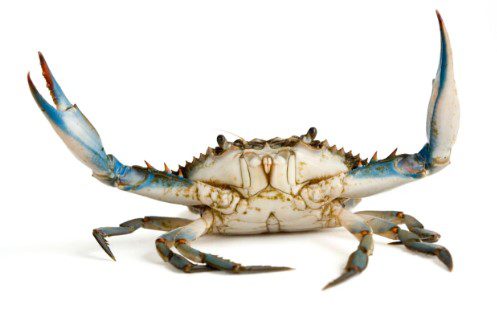

Blue crabmeat is a protein-rich food that can bring numerous benefits to dogs when served in moderation. It contains omega-3 fatty acids, Vitamin B12, and zinc. Despite its nutritional content, blue crabmeat should be served carefully due to its high levels of iodine, cholesterol, and sodium. Eating too much of it may lead to an allergic reaction or result in problems such as heart disease, kidney issues, or sodium poisoning.
Blue crab meat is a good source of lean protein that can provide numerous benefits. It contains omega-3 fatty acids, which support heart health, vitamin B12, and zinc, which boost brain function and help regulate metabolism.
While blue crabmeat is rich in protein and essential vitamins and minerals, its consumption should be moderated due to certain risks. Raw blue crab in the shell may contain intestinal parasites, and its high levels of iodine, cholesterol, and sodium can lead to various health complications, such as an allergic reaction, heart disease, kidney problems, and sodium poisoning. While blue crabmeat is rich in protein and essential vitamins and minerals, its consumption should be moderated due to certain risks. Raw blue crab in the shell may contain intestinal parasites, and its high levels of iodine, cholesterol, and sodium can lead to various health complications, such as an allergic reaction, heart disease, kidney problems, and sodium poisoning.
Since blue crabmeat is high in these components, it should be served to dogs in small portions. If the dog appears to be having an adverse reaction, reduce the quantity or stop serving the food altogether.
Blue crabmeat is a delicious seafood dish enjoyed by humans, and it turns out that dogs can enjoy it too! Common names for this seafood dish are Maryland Blue Crab, Chesapeake Blue Crab, or, simply, Blue Crab. It originates from the Eastern seaboard of North America, around the Chesapeake bay, and is popularly consumed in other parts of the United States and abroad.
Blue crab meat offers your dog some great benefits, such as being a lean source of protein, containing omega-3 fatty acids for heart health, and vitamins B12 and zinc to help boost brain function and regulate metabolism. If offered in moderation, it can be a tasty treat for your dog. However, while the benefit may sound appealing, there are also some risks that come with it. The raw blue crab meat in the shell may contain intestinal parasites, and it is high in iodine and cholesterol, making it hard for your dog to digest. Additionally, eating blue crab meat can trigger an allergic reaction in some dogs.
Serving blue-crab meat to your dog does not have to be a complicated process. It is affordable and easy to access. To ensure your pup’s safety, you should cook the blue crab meat thoroughly before serving it. Alternatively, you may substitute it with other healthy seafood options such as salmon or whitefish.
Readers may wonder whether blue crab meat should be served routinely or not. It is important to remember that they should only be served occasionally, as the high levels of cholesterol and sodium in blue crab meat may be harmful to their health. Additionally, it is also recommended to monitor your pup's reaction the first time you serve it - watch out for any signs of allergies or intolerance.
Does your pup love blue crab meat? Tell us more about your pet's experience with this delicious seafood. We would love to hear from you! No matter what, make sure that your furry friend is always enjoying their meals and getting all the nutrition they need. Bon appetit!Blue crabmeat is a delicious seafood dish enjoyed by humans, and it turns out that dogs can enjoy it too! Common names for this seafood dish are Maryland Blue Crab, Chesapeake Blue Crab, or, simply, Blue Crab. It originates from the Eastern seaboard of North America, around the Chesapeake bay, and is popularly consumed in other parts of the United States and abroad.
Blue crab meat offers your dog some great benefits, such as being a lean source of protein, containing omega-3 fatty acids for heart health, and vitamins B12 and zinc to help boost brain function and regulate metabolism. If offered in moderation, it can be a tasty treat for your dog. However, while the benefit may sound appealing, there are also some risks that come with it. The raw blue crab meat in the shell may contain intestinal parasites, and it is high in iodine and cholesterol, making it hard for your dog to digest. Additionally, eating blue crab meat can trigger an allergic reaction in some dogs.
Serving blue-crab meat to your dog does not have to be a complicated process. It is affordable and easy to access. To ensure your pup’s safety, you should cook the blue crab meat thoroughly before serving it. Alternatively, you may substitute it with other healthy seafood options such as salmon or whitefish.
Readers may wonder whether blue crab meat should be served routinely or not. It is important to remember that they should only be served occasionally, as the high levels of cholesterol and sodium in blue crab meat may be harmful to their health. Additionally, it is also recommended to monitor your pup's reaction the first time you serve it - watch out for any signs of allergies or intolerance.
Does your pup love blue crab meat? Tell us more about your pet's experience with this delicious seafood. We would love to hear from you! No matter what, make sure that your furry friend is always enjoying their meals and getting all the nutrition they need. Bon appetit!